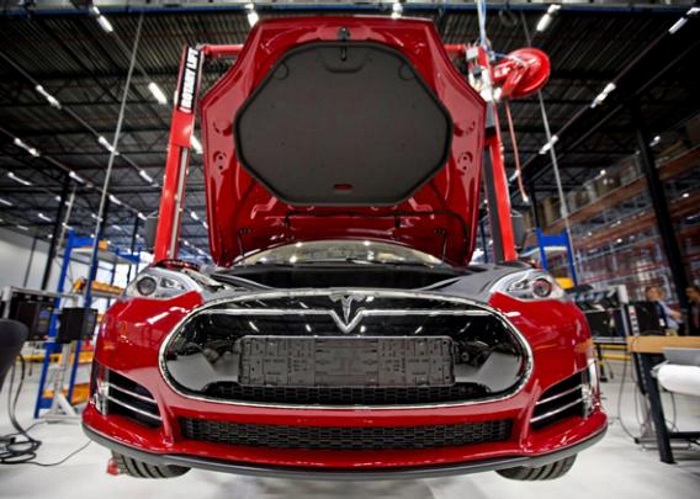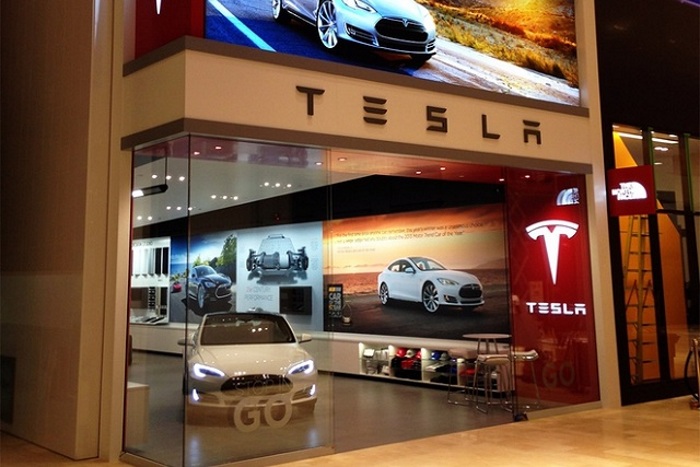In a move that doesn’t exactly improve the sour opinion most Americans already have of car dealerships, Georgia’s Auto Dealer Association (GADA) has formally filed a petition to see the state’s Tesla store closed due to the company’s violation of state law.
Tesla’s crime? The company has sold 173 cars directly from its factory-owned store, exactly 23 more than what it’s allowed to sell per year. GADA argues that as a result, the electric-powered motor vehicle company should lose its dealer license entirely.

“It’s just very simple — we want them to comply with the law the way others are,” Bill Morie, president of the Georgia dealers association, told Automotive News.
Worth noting about this particular case is the fact that Tesla has only one store in the entire state —
it’s located 25 miles outside Atlanta. The next nearest stores are Nashville, which is four hours away, Tampa, which is six hours away, and St. Louis, which is eight hours away.
While this particular GADA v. Tesla story might seem like a one-off, it’s actually a reflection of a much larger brouhaha taking place right now between the company and country-wide dealers. You see, Tesla is in the midst of fighting for the right to sell its vehicles without having to use a dealer network. Manufacturers and dealers throughout the country are taking insult to this and are in the process of doing everything they can to carve out what’s affectionately being referred to as “No Tesla territories” . . . and they’ve been fairly successful in their endeavors so far. Areas where Tesla cannot sell its cars stretch 26 states and affect approximately 200 million consumers (for reference, should GADA win its appeal, 10 million Georgians will lose the right to purchase a Tesla vehicle in their home state).

How have these dealerships been so successful with their anti-Tesla campaign? Special-interest groups in the automotive industry have tight relationships with statehouse legislators. As a result, many a dealer-sponsored legislation gets passed unanimously — even in instances where there’s substantial tax increase for the state’s citizens.
This point actually brings us back to Georgia because it’s what happened last year. The state wanted more revenue and so introduced a “Title Added Value Tax,” meaning everyone would pay a 6.5% tax based on the value of the vehicle they’re purchasing. It made sense on paper, as everyone would be taxed the same, but it’s not what happened:
• Georgia dealers that self-finance vehicles were give a 2.5% tax reduction, paying just 4% on their vehicle’s value
• Trade-ins were allowed to be used as deductions on the tax, which gave dealers an edge over private sellers
Despite the bill not being fair for everyone in the state, it passed unanimously in the Senate, and by 95% in the House of Representatives.
This level of complicity is what Tesla is up against right now. A private company that wants to sell its product straight from the factory directly to the consumer — free enterprise without any middleman — is now viewed as the enemy in 26 states.
There are two ways that Elon Musk and the folks at Tesla can resolve this issue. The company can give in and hire dealers, paying them incentives and rebates that can be passed on to consumers. The problem with this is the company will eventually cede creative control over how the cars are marketed. It can also pursue legislative and legal action, but that is a costly venture and one that appears to be an entirely uphill battle.
It’s an interesting story to follow, and one that is likely to heat up as the company gets ready to introduce its lower-priced models in the coming years. This will likely draw the attention of more middle-class Americans who will want to see Tesla stores in their states so they don’t have to travel four, six, or eight hours away just to test-drive the vehicle and decide whether or not they want to purchase it.
Story via Yahoo
Advertisement
Learn more about Electronic Products Magazine





